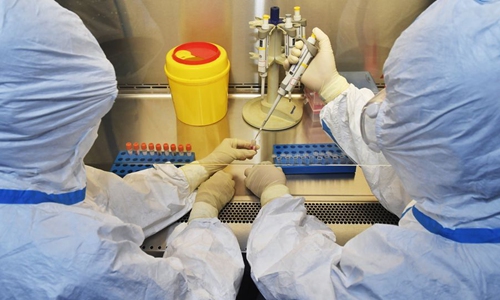HOME >> CHINA
Chinese scientists find two mutations from COVID-19 virus
By Wang Qi Source:Global Times Published: 2020/3/4 22:28:40 Last Updated: 2020/3/4 23:38:40

Staff members work at the health and quarantine comprehensive laboratory of Sichuan International Travel Health Care Center (Chengdu Customs Port Outpatient Department), in Chengdu, southwest China's Sichuan, Feb. 15, 2020. (Xinhua/Liu Kun)
Medical experts said there might be more variants discovered as infections spike globally, since the mutation occurs from virus' adapting to different environments and hosts.
By analyzing the genome-wide molecular evolution of 103 novel coronavirus samples, scientists from Peking University's School of Life Sciences and Institut Pasteur of Shanghai, Chinese Academy of Sciences found 101 samples that can be categorized into S-cov and L-cov based on 149 mutation spots on virus strains.
The research was published Tuesday in the National Science Review.
The paper states that S-cov, accounting for 30 percent, is closer to the bat-related coronavirus and is relatively older, while the L-cov was more prevalent in the early stages of the outbreak in Wuhan but declined in early January.
Most of the patients were infected with only one of the two variants. But sample of an American patient who had recently traveled to Wuhan suggested he might have been infected with both. Scientists say the possibility of a third mutation cannot be ruled out.
Yang Zhanqiu, a Wuhan-based virologist, told the Global Times on Wednesday that the American patient was probably infected with a third variant yet to be identified with enough samples. Usually a person can only be infected with one subtype of the coronavirus because different types clash with each other.
It is very likely that the adaptation of the coronavirus to different environments and hosts leads to the mutation before infecting humans, which means there is more than one wildlife as a middle host and more than one place of origin, Yang said.
More mutations could occur as the virus is now spreading globally, he said.
Top Chinese respiratory specialist Zhong Nanshan said last week that COVID-19 "may not have originated from China" and some experts believe that the coronavirus has multiple birthplaces with different transmission chains.
Hang Changshou, a virologist and former research fellow at the Chinese Center for Disease Control and Prevention, told the Global Times that virus mutations do not affect current prevention measures as they are targeted to all viruses.
New variants will not weaken the effectiveness of the existing treatment methods as the mutation was minor in the gene sequence and did not change the nature of the virus. On the contrary, it would be helpful in research on the pathogen and the development of targeted vaccines, Hang said.
Newspaper headline: Chinese scientists find two virus mutations
Posted in: SOCIETY